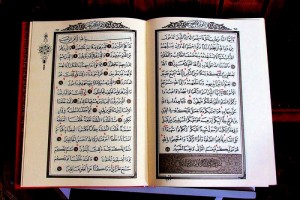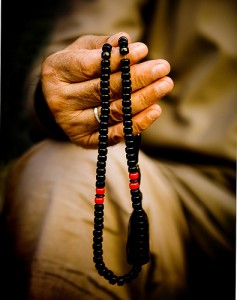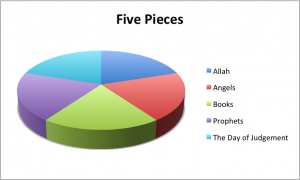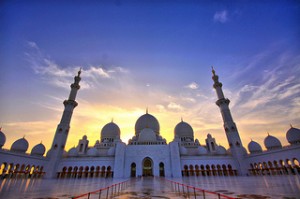Islamic Theology – Allah, Beliefs, and Salvation

Qu’ran
by Roel Wijnats, used under 
By: Eric Day, Mackenzie Hopkins, Henry Robison
Under the context of Islamic theology, the sheer number of traditions and beliefs may overwhelm readers at first glance; each sura of the Qu’ran and the teachings of the Hadith present the many intricacies and nuances of expected behavior, required prayers, and the expectation of Muslims to be charitable. Through this research of each, though, a few key aspects of the Islamic faith stand out, notably from the Shahada and from the fourth sura of the Qu’ran: that Muslims must believe in “Allah, and His angels and the Books and the Prophets and the Last Day…” (Qu’ran 4:136) in order to enjoy the grace and everlasting mercy of Allah and receive everlasting salvation in His appointed Paradise. This report will go on to explain the most fundamental ideas of Islam: faith, belief, and salvation in respect to the five articles of belief.

The Great Umayyed Mosque of Damascus, Syria/Prayer Beads
by James Gordon, used under 
The most crucial belief in the Islamic faith is the belief in Allah, the only God. Allah, the “creator of the heavens and the earth” (Qu’ran 12:101) is a loving God, and one that is “all-forgiving and all-merciful” (Qu’ran 39:53). The Qu’ran is filled with examples of His sheer grace, incomprehensible omniscience, and ever powerful omnipotence; in the Qu’ran, for instance, it is held true that He is “all-knowing and all-wise” (Qu’ran 12:100), and that He is the “knower of the known and the unknown” (Qu’ran 13:9), and even that “…Allah is fully knowledgeable of you as He produced you from the earth…[ever] since you were a foetus [sic] in your mother’s womb” (Qu’ran 53:32). In the Qu’ran, the prophets purport His existence, exclaiming His power over humans and urging others to repent their transgressions as to avoid the pits of Hell after death (Qu’ran 2:22, 2:28-29, 13:9, 39:53-54, 53:32). At the very least, Allah is a loving God, and it is asked of each person to “adore [the] Lord who created you, as He did those before you, that you could take heed for yourselves and fear Him” (Qu’ran 2:21).
The belief of angels is also required for devout Muslims, as angels have been the messengers and servants of Allah since he created them (Qu’ran 2:30). Unto Him they praise and carry out His holy duties – except for one, Iblis. Iblis, the “insolent disbeliever,” (2:34) disdained and set forth upon the land to wreak havoc and lead humans astray (Qu’ran 7:27). Otherwise, Jibrael (Gabriel) and the other archangels were important in carrying out duties as ordered by Allah, the most important being the birth of Jesus (Qu’ran 19:16-21) and Muhammad’s first revelation (Qu’ran 53:4-9). Otherwise, while the belief of angels is a key point of Islamic belief, it is not completely important in respect to the salvation and daily devotions of Muslims.
In the same way, the devout Muslim is instructed to believe in the Books and the prophets in order to fully enjoy Paradise. The Books, referenced in the Qu’ran are the various Holy Scriptures brought on this earth through the prophets; the Torah brought to this earth by Moses  (Qu’ran 53:36), the Psalms written by King David (Qu’ran 21:105), and the Gospel taught by Jesus (Qu’ran 5:46, 48:29) are all Holy Books according to the Qu’ran, and Muslims must believe in the holy, God breathed attributes that each share with the Qu’ran. The Holy Book brought by Muhammad is special, though, as it is held to be completely infallible and the final prophetic book due to the Seal of the Prophets (Qu’ran 33:40). The guidelines for the Islamic faith and the path to righteousness is outlined in the Qu’ran and the Holy Books, and are some of the most influential materials available to guide one on their path to salvation.
(Qu’ran 53:36), the Psalms written by King David (Qu’ran 21:105), and the Gospel taught by Jesus (Qu’ran 5:46, 48:29) are all Holy Books according to the Qu’ran, and Muslims must believe in the holy, God breathed attributes that each share with the Qu’ran. The Holy Book brought by Muhammad is special, though, as it is held to be completely infallible and the final prophetic book due to the Seal of the Prophets (Qu’ran 33:40). The guidelines for the Islamic faith and the path to righteousness is outlined in the Qu’ran and the Holy Books, and are some of the most influential materials available to guide one on their path to salvation.
Not only are the Books important, but the prophets that brought the material to this earth are to be regarded with utmost respect as they brought their teachings and God’s Word to the masses. The Qu’ran is filled with interactions where Allah instructs Muslims how to respond when Jews, Christians, or any unbelievers question the validity of the Islamic faith; for example, one of the most commonly repeated passages in the Qu’ran deals with the faith and the Prophets. When questioned, Allah instructs Muslims to respond:
We believe in God and what has been sent down to us, and what had been revealed to Abraham and Ishmael and Isaac and Jacob and their offspring, and that which was given to Moses and (Jesus) Christ, and to all other Prophets by the Lord. We will make no distinction among them, and we submit to Him. (Qu’ran 2:136, 3:84)
In fact, belief in the prophets is crucial to the salvation of Muslims and the admittance into Paradise. In the Qu’ran, Muslims are instructed to “hasten for the forgiveness of your Lord and Paradise (Heaven) whose expanse is as wide as that of the heavens and the earth, which has been prepared for those who believe in Allah and His apostles [emphasis added]” (Qu’ran 57:21)

Sheikh Zayed Grand Mosque
by Hisham Bin Suwaif, used under 
Lastly, but most importantly, is the belief in the Last Day of Judgment. On the Final Day, only known to the Lord (Qu’ran 33:63), Allah will bring forth the Mizan scale and weigh the good and bad deeds of each human being, dead and alive; the humans who have performed far more good deeds and followed the ways of Allah will be rewarded with eternal life in Paradise, and the unbelievers that never followed Allah and believed in the Prophets and the Books and such will live eternally in Hell (Qu’ran 5:82-86, 7:8-9, 21:47). Deeds are asserted to be the most important aspect of a Muslim’s salvation; as Dr. Israr Ahmed mentioned in his book, The Way to Salvation in the Light of Surah Al-Asr:
One Muslim scholar correctly observed that there are very few cases in the Qur’an where belief alone has been mentioned, and even in these cases we can most often, on deeper reflection, discover an implicit reference to the moral and practical obligations that genuine faith must entail. (Ahmed, 2004, pg. 22)

3D Scales of Justice
by Chris Potter, used under 
While salvation by faith is rarely mentioned in the Qu’ran, Muhammad himself asserts salvation is brought also by faith and God’s mercy, saying: “without the mercy of God no one can attain salvation by virtue of his action.” His companions then asked, “Not even you, O messenger of God?” [Muhammad] replied, “Not even I. God will, however, cover me with His mercy” (Geisler & Saleeb, pg. 126). Either way, it is still evident that the weighing of the deeds is the most important factor in the acceptance into Paradise and eternal salvation in the eyes of Allah.
It is remarkable how the poetic prose of the Qu’ran fully explains the love, mercy, and tenets of Allah while guiding Muslims in their path towards righteousness and salvation. Through each story of the Prophets, Allah’s instructions, and the recounted aspects of the Final Day comes a deeper understanding of what Allah expects in terms of faith and practice for a Muslim’s salvation. There is no question that understanding this material from the Qu’ran and taking it to heart would be the most righteous way to live in His eyes.
Works Cited
Ahmed, D. I. (2004). The Way to Salvation in the Light of Surah Al-Asr. Bombay: Islamic Research Foundation.
Bin Suwaif, H. (2005). Sheikh Zayed Grand Mosque [Digital Image]. Retrieved from http://www.flickr.com/photos/4444/6887385701. Available from Attribution-ShareAlike 2.0 Generic.
Geisler, N., & Saleeb, A. (1993). Answering Islam. Grand Rapids: Baker.
Gordon, J. (2006). The Great Umayyed Mosque of Damascus, Syria [Digital Image]. Retrieved from http://www.flickr.com/photos/james_gordon_losangeles/7436175878. Available from Attribution-NonCommercial 2.0 Generic.
Potter, C. (2012). 3D Scales of Justice [Digital Image]. Retrieved from http://www.flickr.com/photos/86530412@N02/7953227784. Available from Attribution 2.0 Generic.
Wijnants, R. (2008). Koran [Digital Image]. Retrieved from http://www.flickr.com/photos/roel1943/2883613390. Available from Attribution-ShareAlike 2.0 Generic.